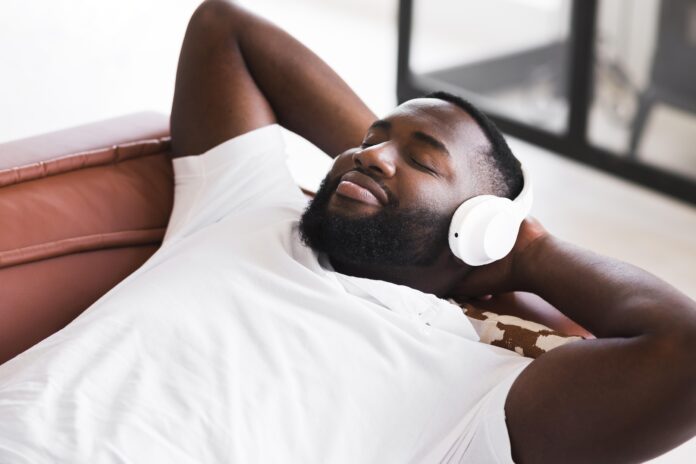Newswise — (SACRAMENTO) — Sleep is one of the pillars of health, including mental health. Approximately 30% to 40% of adults will experience insomnia at some point this year, and about 8.4% of adults take sleep medications most nights.
Helping patients get a better night’s sleep is something Jesse Koskey, a psychiatrist in the UC Davis Department of Psychiatry and Behavioral Sciences, thinks about a lot.
“Sleep problems can happen with almost every psychiatric diagnosis. So, sleep is something I often talk about with my patients,” Koskey said. He shares specific “sleep hygiene” tips with his patients. The advice is based on cognitive behavioral therapy for insomnia or CBT-I.
Koskey explained that behavioral changes, and not medications, are the best approach to improving sleep. This is why he was interested in learning more about music for sleep.
In a review paper published in The Carlat Report, Koskey found listening to music reduces the overall severity of insomnia, improves sleep quality and helps to initiate sleep. The effect was comparable to prescription sleep medications, such as the Z-drugs and benzodiazepines.
“Music is a low-cost, accessible, and effective treatment for insomnia. The only side effect I came across was the ‘earworm effect,’ where a song gets stuck in your head,” Koskey said.
Music thought to produce ‘entrainment’
Sleep music playlists, like those found on Spotify, Pandora, Apple Music and others, tend to feature slow-tempo, ethereal music.
Koskey explained that these slower-tempo songs are thought to produce an effect known as “entrainment.”
Entrainment is when your body synchronizes with your environment or another person, such as falling into step when you walk with a friend. The same entrainment can happen with music.
Music around 60 beats per minute (bpm), which is the same as a relaxed heart, can entrain the rest-and-digest part of your nervous system (the parasympathetic system), leading to a slower, more relaxed heart rate.
In addition to slowing your heart rate, research has shown that relaxing music can also reduce blood pressure in listeners.
The ambient music trio Marconi Union set out to entrain relaxation through their composition “Weightless.” The piece starts at 60 bmp and gradually slows over the next eight minutes to finish at 50 bpm. A small study of healthy volunteers showed listening to “Weightless” reduced blood pressure and anxiety.
Any type of music can potentially help with sleep
In the studies Koskey looked at, the participants preferred familiar tunes without lyrics and songs with slow tempos, regular rhythms, bass tones and tranquil melodies.
But the good news is that you don’t have to listen to slow ethereal music to get sleepy unless that’s what you like.
“A lot of studies include relaxing classical or ambient songs. But one study showed that the music participants picked out themselves — including video game and pop music — helped just as much as an album called ‘The Most Relaxing Classical Music,’” Koskey said.
In addition to finding playlists on streaming services, you can Google “sleep music” and find a large selection of tunes. One caveat is to avoid anything that requires your phone’s screen to be on continuously — like a video — which is not ideal for sleep.
More than one way to listen to music for sleep
Koskey also found that there’s no one way to listen to music when you are trying to get to sleep. Headphones worked as well as speakers. Some of the study participants listened to music for 30 to 60 minutes. Others listened all night.
“The gist is that there’s no wrong way to try music as a sleep aid. And it’s likely to help with mild sleep problems,” Koskey said.
An added bonus is that music can mask ambient noises, facilitate distraction, and become a pleasurable part of a sleep routine.
Although promising, Koskey pointed out some limitations of the research. One caveat is that most of the studies enrolled people with mild sleep problems, and most of the studies were small. And it wasn’t possible to do a double-blind study — the gold standard for clinical research — since participants would know if they were listening to music.
He also noted that sleep’s relationship to physical and mental health is a two-way street: If you are not sleeping well, your overall health can suffer. But poor sleep might also indicate that something is already going on that needs attention.
“If you have set aside enough time to sleep, but your sleep is not restorative, and you’re getting tired during the day, let your primary care provider know,” Koskey said.
Source: /Newswise
Image: Freepik


































